by M. C. Jennings | Nov 28, 2023 | Academics, Alumni Spotlight, COBA Faculty, College Decisions, Current Students, Economics, Faith Infusion, Social Entrepreneurship, Uncategorized
Written by special contributor Lance Fleming
Costa Rica, a small Central American country, is experiencing a significant increase in tourism. Travel officials in Costa Rica expect an unprecedented surge in tourists in 2023 and 2024. This country is famous for its national parks, rainforests, beaches, wildlife, and outdoor activities.
ACU students in the College of Business Administration have been traveling to Costa Rica since an initial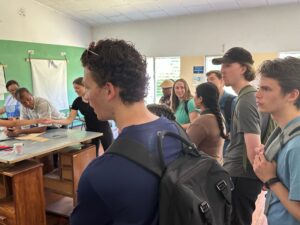 Central America Study Abroad trip with Dr. Mark and Dr. Laura Phillips in 2016. In 2018, they traveled to Turrialba, Costa Rica to visit CATIE, an agricultural university with a focus on economic development. In 2019, the first Social Enterprise Consulting class was offered and the partnership with CATIE began, focusing on economic development. But those students aren’t just in Costa Rica to observe. They are learning practical skills in research, marketing, and product creation from a class taught by Dr. Laura Phillips, Dr. Sarah Easter, Dr. Jennifer Golden, Dr. Mark Phillips, and Daniel Garcia. Currently, the class is working with local entrepreneurs to launch products made from materials donated by Southwest Airlines.
Central America Study Abroad trip with Dr. Mark and Dr. Laura Phillips in 2016. In 2018, they traveled to Turrialba, Costa Rica to visit CATIE, an agricultural university with a focus on economic development. In 2019, the first Social Enterprise Consulting class was offered and the partnership with CATIE began, focusing on economic development. But those students aren’t just in Costa Rica to observe. They are learning practical skills in research, marketing, and product creation from a class taught by Dr. Laura Phillips, Dr. Sarah Easter, Dr. Jennifer Golden, Dr. Mark Phillips, and Daniel Garcia. Currently, the class is working with local entrepreneurs to launch products made from materials donated by Southwest Airlines.
Dr. Mark Phillips and Garcia will teach the class next semester, and then Easter and Golden will teach a summer course. Students in each class will go over topics teaching them how to be a consultant, how to help without hurting, Costa Rican culture (both generally and in the business world), and some project-specific topics.
During Spring Break, the spring semester class will be in Costa Rica, and afterward, they will focus on completing their deliverable to the client for the rest of the semester. Dr. Laura Philips said the summer class will have a different format. It will include 5-6 weeks of online content on the same topics as in the spring. After that, students will spend nearly two weeks in Costa Rica to work on the project.
AACSB (the Association to Advance Collegiate Schools of Business) seeks to encourage all accredited schools to make a societal impact. As they state on their website, “AACSB’s vision of societal impact is that business schools contribute their specialized expertise to help mitigate some of society’s most pressing economic, social, human, and environmental problems.”
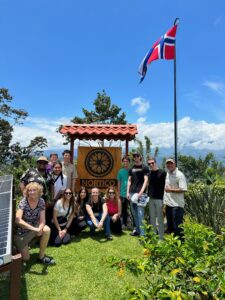 COBA was already seeking to make a broader societal impact through their programs. Now the Costa Rica activities are part of a broader COBA initiative. Dr. Laura Phillips said, “It’s exciting because AACSB is now asking us to do more of what we were already doing. The change isn’t to the consulting class. What’s different now is that we will have more activities (curricular, research, and engagement) focused on the same theme of Increasing Educational and Economic Opportunities for People in Marginalized Groups.”
COBA was already seeking to make a broader societal impact through their programs. Now the Costa Rica activities are part of a broader COBA initiative. Dr. Laura Phillips said, “It’s exciting because AACSB is now asking us to do more of what we were already doing. The change isn’t to the consulting class. What’s different now is that we will have more activities (curricular, research, and engagement) focused on the same theme of Increasing Educational and Economic Opportunities for People in Marginalized Groups.”
A five-person committee began meeting earlier this year to come up with a theme for the college’s work, Increasing Educational and Economic Opportunities for People in Marginalized Groups, and a tentative five-year plan.
“The plan includes curricular, research, and engagement objectives for our residential and online campuses,” Dr. Phillips said. “The Costa Rica class is one piece of this plan. We want the societal impact plan to provide opportunities for all interested faculty and staff to be involved, and that is part of the reason we are expanding the faculty who teach the consulting class. The plan also includes the development of additional partners for consulting projects. We are interested in developing a second international partner as well as cultivating a partnership closer to home.”
When Dr. Phillips first visited the CATIE campus with students in 2018, she connected with Dr. Eliecer Vargas, an economist at CATIE who specializes in economic development, which aligns well with the COBA students’ focus in Costa Rica.
Five years ago, students spent a few days exploring tourism startups by rural female entrepreneurs in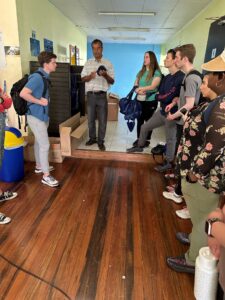 towns near Turrialba. After their trip, Dr. Phillips and Dr. Easter approached Vargas to discuss the idea of starting a consulting class and having the group of female entrepreneurs as their first client. Vargas agreed, and Dr. Phillips and Dr. Easter took their first group of consulting students to Costa Rica in the spring of 2019.
towns near Turrialba. After their trip, Dr. Phillips and Dr. Easter approached Vargas to discuss the idea of starting a consulting class and having the group of female entrepreneurs as their first client. Vargas agreed, and Dr. Phillips and Dr. Easter took their first group of consulting students to Costa Rica in the spring of 2019.
Southwest Airlines has served as the air provider for ACU’s program, transporting students and professors to and from Costa Rica, and in 2022, Southwest Airlines arranged a deal with CATIE to give the university seats from their refurbished planes.
The Turrialba region is now a major focus of Southwest’s investments. The company has set up a leatherworking shop on campus where local women and men can receive training and have access to leather and high-quality sewing machines with their support.
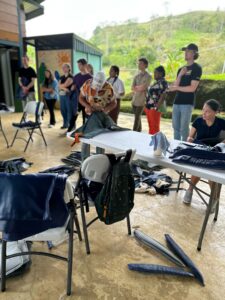 As part of Southwest Airlines’ “Repurpose with Purpose” program, each of the company’s fleet of airplanes is overhauled every four years, and as a part of that process, the seat leather is replaced. The leather pulled out of the planes is donated to nonprofit organizations for upcycling projects.
As part of Southwest Airlines’ “Repurpose with Purpose” program, each of the company’s fleet of airplanes is overhauled every four years, and as a part of that process, the seat leather is replaced. The leather pulled out of the planes is donated to nonprofit organizations for upcycling projects.
The idea is to create a business incubator to launch businesses as people graduate from the training program. Jobs are also being created in rural communities because CATIE receives intact seat covers that must be deconstructed before they are upcycled into new products.
And that’s where the ACU students enter the picture.
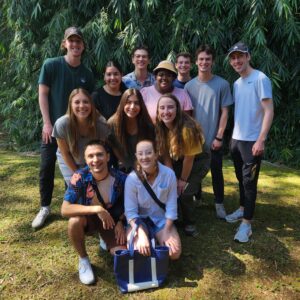 The students’ client is called Wearsos – the first business to come out of the leather project – and it was started by the husband-and-wife duo of Lynne Corvaglia and Chris Riquelme. Aside from upcycled bags, the company also plans to make other products like passport holders, wallets, luggage tags, and shoes.
The students’ client is called Wearsos – the first business to come out of the leather project – and it was started by the husband-and-wife duo of Lynne Corvaglia and Chris Riquelme. Aside from upcycled bags, the company also plans to make other products like passport holders, wallets, luggage tags, and shoes.
No two trips to Costa Rica have been alike, with the specifics of the project changing with every trip, usually at the request of the client. That means the specific business topics the students focus on vary.
“They always learn something from the business side of the project, although the bigger learning outcomes stem from the nature of cross-cultural consulting,” Dr. Phillips said. “The students have to stretch their problem-solving and critical-thinking skills and they have to do that in a group setting and not just on their own. Their flexibility and adaptability are put to the test every day we are there.
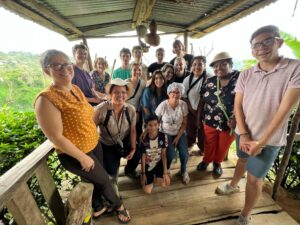 “They learn that other cultures may have different objectives and priorities for their business than what they usually see in the U.S., and they learn that the American measures of success are not the only measures,” she said. “They also learn that to provide useful recommendations for the client, they have to truly understand the client’s objectives and tailor their business solutions to meet the needs and the desires of the clients.”
“They learn that other cultures may have different objectives and priorities for their business than what they usually see in the U.S., and they learn that the American measures of success are not the only measures,” she said. “They also learn that to provide useful recommendations for the client, they have to truly understand the client’s objectives and tailor their business solutions to meet the needs and the desires of the clients.”
From the business skill side, Dr. Phillips said, the students have worked on market assessments and provided feedback based on the personas of different target customers. One class conducted focus groups to provide market research on potential products. Classes have researched logistics to help the client as they prepare to ship goods from Costa Rica to the US and Canada.
Other students created a comprehensive marketing plan (Instagram and Facebook posts, email campaigns,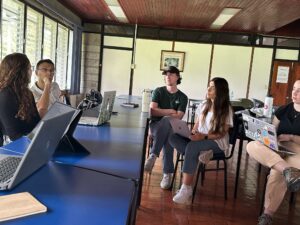 etc.) to help a client roll out a Kickstarter campaign. Students listened to entrepreneurs talk about current and future product ideas as well as where and how they intend to sell and then provided a comprehensive list of questions to each entrepreneur to help them think through and further develop their business plans.
etc.) to help a client roll out a Kickstarter campaign. Students listened to entrepreneurs talk about current and future product ideas as well as where and how they intend to sell and then provided a comprehensive list of questions to each entrepreneur to help them think through and further develop their business plans.
Dr. Phillips said proposed expansion plans for the program that have been discussed are for the Costa Rica consulting class to be offered twice each year: once in the spring and once in the summer with a variety of faculty involved in teaching the class. Dr. Phillips also said she would like to involve COBA alumni on the trip to provide their expertise in the project’s area of focus.
“That could be social media marketing, logistics, building basic business plans, finding funding sources, or rural development,” she said. “I also hope to continue our partnership with Southwest Airlines. It has been valuable to be working with their Repurpose with Purpose group because we can truly partner to support these clients.”
To learn more about the College of Business at ACU, click here.
by M. C. Jennings | May 19, 2023 | Academics, Alumni Spotlight, COBA Faculty, COBA Staff, College Decisions, Current Students, Faith Infusion, Human Resource Management, Management, Outcomes, Student Spotlights, Student Spotlights
Written by special contributor Lance Fleming
Each day, students across the ACU campus display the university’s mission to educate students for Christian service and leadership throughout the world through their actions and acts of service on the campus. Each year, students like those are nominated by their academic departments. From those nominations, 50 scholars are selected by the ACU Faculty Senate to receive the University Scholars Award for their graduating class.
Among those 50 scholars who demonstrated outstanding scholarship by maintaining a grade point average (GPA) of 3.5 or higher, earning 90 hours towards their degree, and continuing the pursuit of knowledge in their research field, seven are students from the College of Business Administration. The COBA students who received this year’s University Scholars Award are Kathryn Crawford, Gracie Isham, Matthew Roberson, Will Harris, Diego Lozano Welsh, Ben Blackmon, and Garrett Powell.
We have been highlighting each of those seven individuals over the last few weeks, including this profile of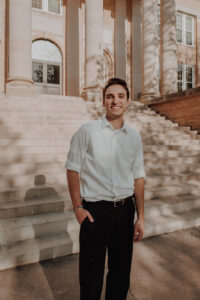 Diego Lozano Welsh. A native of Coppell, Texas, Diego recently graduated with a 3.87 GPA as a business management major. In June, he will begin work as a Talent Acquisition Specialist for Sinacola, a construction company in Frisco, Texas.
Diego Lozano Welsh. A native of Coppell, Texas, Diego recently graduated with a 3.87 GPA as a business management major. In June, he will begin work as a Talent Acquisition Specialist for Sinacola, a construction company in Frisco, Texas.
As a student, Diego – a member of Frater Sodalis – was instrumental in reviving the Lighthouse Catholic Student Organization, which was hit hard by COVID in 2020 and almost disappeared. But with the help of sponsors and parishes in Abilene, Diego led the effort to bring the organization back to campus. He was also part of Lynay, and as a freshman, he began doing volunteer work with “Palm House Kids,” a group that provides children from lower-income families a meal and a place to play and teaches them about Jesus.
Diego recently answered a few questions about his time at ACU and in COBA, covering everything from his most influential class to the most unique thing he’s been a part of while at ACU:
Q: What is the most important thing you’ve learned about yourself at ACU?
Welsh: “The most important thing I’ve learned about myself is that I have been equipped to spread the gospel. I learned how to involve my faith in everything that I do. This allows me to show my hope in Christ and bring that hope to others.”
Q: What professor or class has impacted you most and why?
Welsh: “Dr. Matt Deeg greatly impacted my development during college. I was lucky enough to have a class with him for three consecutive semesters. During those semesters, I changed my major and concentration a few times. He walked with me each time, having conversations to help lead me in the right direction. He was a fantastic teacher whom I learned a lot from professionally. However, the most significant impact he had in my life was personally, as a mentor and a friend.”
Q: What has been your experience in COBA?
Welsh: “I have loved every moment in COBA. I got to work as a COBA student ambassador during my senior year, giving tours to high school students and working in the offices for recruitment. That allowed me to have a different perspective on COBA. I saw the faculty and staff every day and experienced the culture in COBA. This was such a fantastic opportunity; it allowed me to build relationships with everyone working there and see them as real people: these relationships and all the experiences I had in COBA combined into a beautiful experience at ACU.”
Q: Of all the things you’ve experienced at ACU, what do you believe will have the most impact on your life?
Welsh: “The relationships I built will be the most impactful. The way that I learned to build relationships with mentors and the friendships I developed will shape how I live the rest of my life.”
by M. C. Jennings | Apr 3, 2023 | Academics, Alumni Spotlight, Current Students, Management, Marketing, Uncategorized
Written by special contributor Lance Fleming
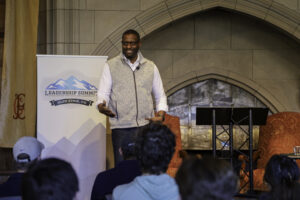 The headlines splashed across newspapers and websites around the country last December and into January certainly weren’t flattering for Southwest Airlines. The airline –annually among the leaders of all airlines in the United States in customer satisfaction – wasn’t making anyone happy with thousands of delayed or canceled flights that left travel-weary customers stranded in airports across the country as they scrambled to return home after the holidays.
The headlines splashed across newspapers and websites around the country last December and into January certainly weren’t flattering for Southwest Airlines. The airline –annually among the leaders of all airlines in the United States in customer satisfaction – wasn’t making anyone happy with thousands of delayed or canceled flights that left travel-weary customers stranded in airports across the country as they scrambled to return home after the holidays.
A massive winter storm caused the initial flight delays and disruptions and turned into a disaster that cost more than $800 million in lost revenue and refunds and reimbursements to customers.
Customer satisfaction fell off, and many Southwest passengers swore they’d never use the airline again after the experience.
Standing in the middle of the storm was ACU graduate Tony Roach (’01), who has been with the airline since 2001, shortly after he graduated with a BBA in Marketing and Management. He started at Southwest as a Field Marketing Coordinator, working his way up the corporate ladder by serving in customer-impacting roles across field marketing, corporate sales, product development, loyalty marketing, customer relations, and customer experience.
Roach has also been tasked with establishing the customer experience corporate function, leading the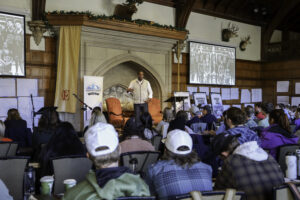 Southwest Promise (the company’s COVID response for customers), spearheading the digital self-service and cabin modernization programs, and executing several other impactful initiatives that continue to generate revenue and improve customer satisfaction.
Southwest Promise (the company’s COVID response for customers), spearheading the digital self-service and cabin modernization programs, and executing several other impactful initiatives that continue to generate revenue and improve customer satisfaction.
In January 2023, he was promoted to Senior Vice President for Marketing and Customer Experience. He will lead the company’s efforts in marketing, product & customer loyalty, digital, customer experience, and customer engagement. Roach’s organization drives customer demand, evolves the Southwest brand, and designs an end-to-end travel journey that maximizes revenue and customer loyalty.
All that to say that Roach leads the departments that have to restore trust in the Southwest brand and win back the customers who were turned off by the problems they experienced during the company’s nightmare winter.
Roach –married and has four children – was recently asked to speak to faculty and students at the annual Leadership Summit in Colorado, touching on various aspects of his Christian leadership style in a secular world and how he has helped lead Southwest Airlines through its most recent trials.
He recently sat down for a question-and-answer session covering everything from his experiences at ACU and in COBA to the company’s response to COVID and the holiday crises. Below is that conversation:
Q: When you look back on your experience at ACU and in COBA, who are some of the people who most influenced you, and what did you take away from them that you’ve carried with you in the corporate world?
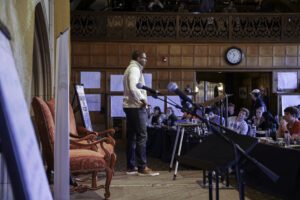 Roach: There are so many people across COBA that I could name. I might not have had direct contact with them, but I recognized they were trying to do things the right way, which made an impact. I really looked up to Dr. (Rick) Lytle, Dr. (Phil) Schubert, and Tim Johnston. Dr. (Gary) McCaleb was one of the most influential people on campus, and I’m forever indebted to him. I was one of the founding members of the LYNAY (Love Your Neighbor As Yourself) group that he led for many years, and he poured into and invested in me. He influenced me in so many ways, including pushing me to strive to be the best I can be in every facet of my life, whether it be in my spiritual life, family, or job. He saw more potential in me than I even saw in myself.
Roach: There are so many people across COBA that I could name. I might not have had direct contact with them, but I recognized they were trying to do things the right way, which made an impact. I really looked up to Dr. (Rick) Lytle, Dr. (Phil) Schubert, and Tim Johnston. Dr. (Gary) McCaleb was one of the most influential people on campus, and I’m forever indebted to him. I was one of the founding members of the LYNAY (Love Your Neighbor As Yourself) group that he led for many years, and he poured into and invested in me. He influenced me in so many ways, including pushing me to strive to be the best I can be in every facet of my life, whether it be in my spiritual life, family, or job. He saw more potential in me than I even saw in myself.
Q: Tell me about the company’s response to the COVID pandemic and what you learned from dealing with all the issues that came about.
Roach: The entire industry was hit hard by COVID because so little was known about how the virus spread. The last thing people thought they needed to do was to get on an airplane. We had to modify how we operated and what the experience would be like for those willing to fly. We did many things like requiring masks and blocking middle seats onboard for social distancing; we even changed how we cleaned the plane after each flight. And we did all those things to help make people comfortable flying again. If you think about what that did to business travel, everything stopped because no one was going to the office. Our team led the customer response, and the lesson learned was that you have to adapt and be ready to pivot.
Q: Go back to the challenges that Southwest faced during the winter with the thousands of flight delays and cancellations, as well as, I’m sure, thousands of unhappy customers. How does Southwest rebuild trust with the public?
Roach: Southwest takes immense pride in taking care of its customers. It’s a huge part of our business model. To see us get to a point where we let a lot of customers down was disheartening for the executive team and frontline workers. It was a hard thing to watch, and it’s been hard to navigate. The first thing we had to do during that time was care for our customers. We had to make sure they knew they could get a refund and that we would help make them whole in other areas. That was the first big thing we did. Now we’re working on rebuilding trust with customers. We’ve always had a great brand, but we recognize that rebuilding trust takes time. So how do you do that? For one, you accept the lessons you learned and make sure you move forward and improve yourself. The second thing is consistency. We have to show we can once again be reliable, and over time we will show that. We’re still the airline everyone has loved for so long, and we’ll come out of this better and stronger. Those are tangible things that we can show customers and employees that we will be better.
Q: In these challenges you’ve been dealing with, how much did you lean on what you learned from your father (Abilene minister Dr. Tony Roach) and at ACU about leading with Christ-centered values?
Roach: You can try to remember some of the subject matter you learn in school, but there are things you learn in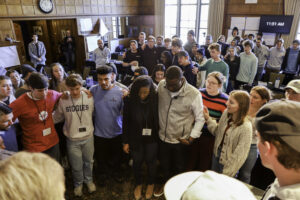 the curriculum, and there are things you learn outside the curriculum. What ACU does is teach you that you can balance a lot of things at once. At ACU, you learn to balance your walk with Christ and academics. You’re blending two things. But I had three when you added athletics (Roach was on the ACU men’s basketball team). Understanding how to pursue and balance what is important to you at once is a skill that can continue to bless your life. I’ve also been lucky to have a father who has given me guidance along the way. He taught me that if you consult with God and walk with Him and abide with Him, He has your back, which keeps everything in perspective. He’s given me a great example; somebody to watch and do things with the right intent.
the curriculum, and there are things you learn outside the curriculum. What ACU does is teach you that you can balance a lot of things at once. At ACU, you learn to balance your walk with Christ and academics. You’re blending two things. But I had three when you added athletics (Roach was on the ACU men’s basketball team). Understanding how to pursue and balance what is important to you at once is a skill that can continue to bless your life. I’ve also been lucky to have a father who has given me guidance along the way. He taught me that if you consult with God and walk with Him and abide with Him, He has your back, which keeps everything in perspective. He’s given me a great example; somebody to watch and do things with the right intent.
Q: You were recently asked to speak at Summit and share your last few months’ experiences. What was your goal in communicating with those students and staff members?
Roach: I was reminiscing that I went to Summit my last year at ACU, so this was a chance to pour back into students sitting in the seats where I once sat. They have so many decisions to come in life and where they’re at. I remember being somewhat overwhelmed by all the decisions that were coming. How do you know what you want to do? If someone had told me then that I’d be doing what I’m doing now, it would have blown me away. I wanted to give them a few things to consider, led by this: what do you think are the principles you need to stay loyal to as you make those decisions? If you remain loyal to the guiding principles, they’ll help guide decisions. And then, I wanted to remind them to be loyal to the gifts that God has given them. We each have values, and if you stay loyal to those, your gift will find its way to you. I reminded them to remain loyal to the Holy Spirit. The gift that God gave all of us is the Holy Spirit. If we stay loyal to listening to the Holy Spirit, that will lead us on our path. Finally, I reminded them to stay loyal to our mission as Christians. We serve the Kingdom. If we stay loyal to serving the mission of the Kingdom, that will guide us in all the decisions we make. My goal through all of that was to tell them it’s OK if they don’t know yet where to go from here. But to stay loyal to their principles because they will guide their paths.
by M. C. Jennings | Oct 20, 2022 | Academics, Accounting, Alumni Spotlight, COBA Faculty, COBA Staff, Current Students, Digital Entertainment Technology, Financial Management, Human Resource Management, Management, Management Information Systems, Marketing, Placement stories, Professional Development, School of Information Technology and Computing, Uncategorized
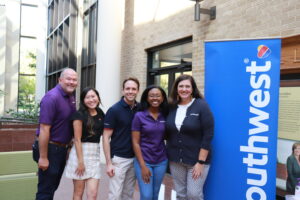
COBA Alums who work at Southwest Airlines recently came to discuss internship opportunities at the company with COBA students. Pictured from left to right are Chris Grubbs (’95), Kristy Ng (’20), Baron Smith (’09), Bethani Culpepper (’19), and Katie Coldwell (’00).
Written by special contributor Lance Fleming
When the College of Business Administration (COBA) unveiled the most significant changes to its curricula in decades, one area of great emphasis was professional development. Those studying the updates and later making the recommendations believed a professional internship would help make COBA students more well-rounded prospective employees when they left ACU.
As Dr. Brad Crisp, the Dean of the College of Business Administration said recently, “… we are placing greater emphasis on professional development by requiring a professional internship in management, marketing, and information systems and offering an internship as an option for accounting and finance majors.”
As the person serving as the director of professional development and internships for COBA, Jasmine McCabe-Gossett said the new emphasis on internships will help make students better equipped to handle real-world practices that they will face when they begin working full-time.
“Students need to take advantage of the unique timing internships can offer,” said McCabe-Gossett, who is in her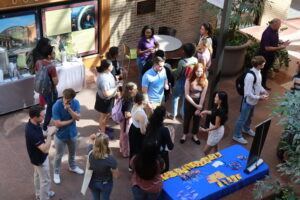 first year as the Professional Development and Internship Director for COBA. “Students have the distinct opportunity to apply what can feel like abstract theories and case studies to the real world. Internships are insulated and allow students to practice in an environment designed for them to ask questions and fail, whereas, post-graduate opportunities can be far less forgiving.”
first year as the Professional Development and Internship Director for COBA. “Students have the distinct opportunity to apply what can feel like abstract theories and case studies to the real world. Internships are insulated and allow students to practice in an environment designed for them to ask questions and fail, whereas, post-graduate opportunities can be far less forgiving.”
Tim Johnston, the Assistant Dean for COBA, said a student who participates in an internship program in college will have a distinct advantage over students who don’t take advantage of those programs.
“Many years ago, with the contraction of the economy, many students were entering college without a lot of summer work experience,” Johnston said. “One of the top qualities all employers like to access is work ethic. Without a lot of work experience, it was difficult to feel confident about a student’s ability to dig-in and work hard. Many large organizations started internship programs.
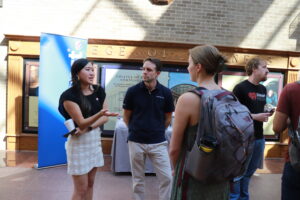
“These programs typically run for 12 weeks during the summer,” he said. “Most are paid and it’s a way for a company to have a long and intense look at the candidates. Many companies only offer full-time opportunities to those students who have completed an internship with their organization. So for many large firms, this is the path into their company.”
When a student is looking for an internship, COBA Associate Dean Andy Little said one thing stands above all when he advises a student on a potential position.
“Fit,” he said succinctly. “In other words, does this organization fit your values and the goals you have set for yourself? Will you get practical experience? What kind of people work there? Is it an industry or market segment that you would like to start your career in?”
McCabe-Gossett agrees that finding an internship in a potential career field is an essential part of finding the right landing spot.
“I encourage students to focus on finding an internship in the industry they imagine as their future career,” she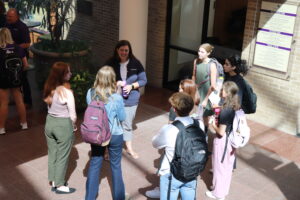 said. “Doing so will allow them to fully immerse themselves so they can determine whether or not their dream industry aligns with their values, work style, etc.”
said. “Doing so will allow them to fully immerse themselves so they can determine whether or not their dream industry aligns with their values, work style, etc.”
The National Association of Colleges and Employers has surveyed employers and determined the following qualities are most important to the potential employers surveyed. In order of importance, those qualities are:
- Problem-solving (critical thinking)
- Teamwork / collaboration
- Professionalism / work ethic
- Verbal and written communication skills
- Digital technology capabilities
- Leadership
- Global / multicultural fluency
“We want our students to demonstrate these competencies and reflect on their current areas of strength and areas where growth is needed,” Johnston said. “Their internship manager completes a formal evaluation that provides feedback on these key qualities.
“Another key advantage we are looking to provide for ACU students is an opportunity to intern with ACU alumni,” he said. “Our alumni teach students how professional excellence provides another avenue to honor God, as we serve in the marketplace.”
If you’d like to know more about internships with COBA, as either an employer or a student, email coba@acu.edu.
by M. C. Jennings | Sep 28, 2022 | Academics, Alumni Spotlight, COBA Events, COBA Faculty, COBA Staff, Current Students, Faith Infusion, Uncategorized
Written by special contributor Lance Fleming
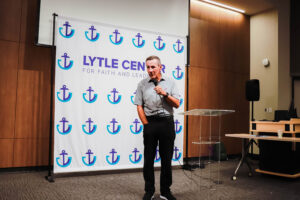 In more than 30 years as the minister at The Hills Church in North Richland Hills, Rick Atchley (’78) has delivered thousands of sermons to millions of people, drawing listeners from near and far to a relationship with Jesus Christ. In Atchley’s tenure with The Hills Church, it has grown to be among the largest Church of Christ congregations in the world, averaging over 5,000 in attendance each week across three campuses.
In more than 30 years as the minister at The Hills Church in North Richland Hills, Rick Atchley (’78) has delivered thousands of sermons to millions of people, drawing listeners from near and far to a relationship with Jesus Christ. In Atchley’s tenure with The Hills Church, it has grown to be among the largest Church of Christ congregations in the world, averaging over 5,000 in attendance each week across three campuses.
As he said when he was named ACU’s Outstanding Alumnus of the Year in 2014, one of the themes of his life and his ministry is to live out Christ’s call to unify and to “bring down walls that God didn’t want up in the first place.”
Atchley spoke to both students and faculty and staff at ACU on Tuesday, September 6th. His address to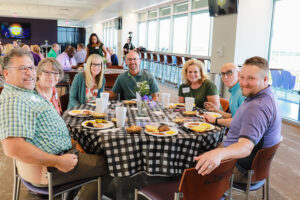 students was a part of the Lytle Center’s Fall Speaker Series while his exhortation to faculty and staff was a part of the Lytle Center’s second annual Abiding in Christ dinner event. The Abiding in Christ dinner was established in 2021 with a vision of encouraging and challenging faculty and staff in the deepening of their relationships with Jesus in order to better influence and serve students. It should come as no surprise that Atchley had a challenge for each group. A mission to follow Christ no matter the setting or circumstances.
students was a part of the Lytle Center’s Fall Speaker Series while his exhortation to faculty and staff was a part of the Lytle Center’s second annual Abiding in Christ dinner event. The Abiding in Christ dinner was established in 2021 with a vision of encouraging and challenging faculty and staff in the deepening of their relationships with Jesus in order to better influence and serve students. It should come as no surprise that Atchley had a challenge for each group. A mission to follow Christ no matter the setting or circumstances.
At the Abiding in Christ dinner, Atchley contended, that ACU should be a place where students attend to not only grow in academic ability but also in wisdom.
“We know there’s a difference between being intelligent and truly being wise, and that’s why I believe the mission of this university is so critical,” he said to a group of around 200 faculty and staff members gathered in the Brown Family Club Level at Anthony Field at Wildcat Stadium. “Let’s be honest: young people don’t have to come to ACU to gain knowledge on how to be an accountant or how to manage the market. They can gain knowledge at many great universities. What I hope for when they come here is that, along with knowledge, they gain wisdom. They learn to be wise, not just smart.”
Atchley then spent several minutes challenging those in attendance to teach their students to look for wisdom and guidance from above and not from other sources.
“What is the wisdom of the world?” he asked. “It’s the knowledge that looks for truth from within instead of above. It’s the Kool-Aid of this culture. The young people you teach have been immersed in it. It’s all about finding their truth. The world has told them to look inside to find truth.”
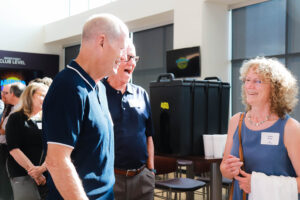 “They don’t have to come here to get knowledge; you’re good at that,” Atchley told the crowd. “You’re good at that. But when they leave with the knowledge you’ve given them, will they be wiser? Will they leave with a worldview that says ‘I’m going to look at life through the lens of the wisdom of Christ? He will be where I get my truth. He will be the framework from which I understand what is right and wrong.’ Will they leave with wisdom, not just knowledge?”
“They don’t have to come here to get knowledge; you’re good at that,” Atchley told the crowd. “You’re good at that. But when they leave with the knowledge you’ve given them, will they be wiser? Will they leave with a worldview that says ‘I’m going to look at life through the lens of the wisdom of Christ? He will be where I get my truth. He will be the framework from which I understand what is right and wrong.’ Will they leave with wisdom, not just knowledge?”
Late in his address to the faculty and staff, Atchley reminded them that they are working and teaching in a society that has been battered by the constant battle between politics and religion. And it’s against that backdrop that ACU faculty and staff must equip students with the wisdom needed to traverse that world, no matter their chosen profession.
“For the Christian educator, the opportunity to prepare students for the world in which they will pursue varied and creative careers must include the role of faith and the pursuit of wisdom,” said Mitzi Adams, Director of Clinical Teaching and Field Experiences in the Department of Teacher Education. “We are challenged to consider how our courses are different from the courses offered at other prestigious universities where students could secure a solid education. At ACU, it must come back to the witness of faith.”
“I think it’s very important for students to hear and experience much more than just knowledge of their field of study,” she said. “At a Christian university, the faith we profess becomes the framework through which we view and experience this education.”
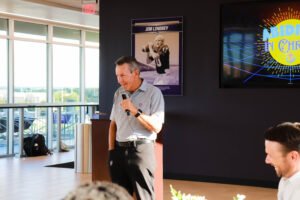 As Atchley pointed out numerous times to the faculty and staff, the prevailing mission of ACU should be to not only equip students with knowledge and wisdom but also the desire to live out their faith in the world around them.
As Atchley pointed out numerous times to the faculty and staff, the prevailing mission of ACU should be to not only equip students with knowledge and wisdom but also the desire to live out their faith in the world around them.
“For a student to walk away from this Christian university without the opportunity to understand and apply where and how faith integrates into their chosen field of study is to have had an important aspect of this education withheld,” Adams said. “If not now, when will our students have the opportunity to be immersed in studies intended to prepare them for excellence in their field? Beyond this, at what other time in the lives of our students will they have the opportunity to be taught by exceptional practitioners, academics, and researchers who are compelled by the Christian faith? Our students are here now. This is an opportunity we have as a faculty to pour into our students not only our professional expertise but also the centering of our faith.”
Before Atchley spoke to the faculty and staff at the football stadium, he met with COBA students, challenging them to choose the battles that matter.
“It’s easy to get passionate and carried away with matters that don’t have much weight,” said Kathryn Crawford, a senior Finance and Management major from Flower Mound. “Instead, we need to recognize the fights that will have an impactful outcome and approach those with our chosen values.”
In addition, his theme with the students was much the same as it would be later with the faculty and staff: that knowledge is easily attainable anywhere but it’s wisdom and obedience in Christ that will make the most impact on the world.
“He made the point that we have to trust the impact of an obedient life,” Crawford said of Atchley. “When things become difficult, the easy way out seems so attractive. But this path does not guarantee obedience. Time and time again, scripture shows us our convictions will cause us to face difficult things in our lives. Choosing obedience may not be easy but the impact we can unknowingly have on the Kingdom is far greater than the temporary adversity we might face.”
Crawford said Atchley’s message to students about integrity and faith in the workplace resonated with her because he put special emphasis on how important the choice will be.
“As a student at a Christian university, it becomes easy to rely on circumstances and surroundings to motivate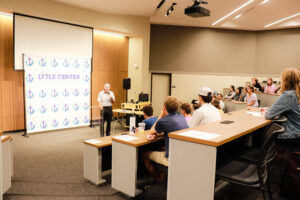 my faith,” she said. “However, I know this won’t necessarily be the case when I emerge into the workforce as a young professional. I value my faith deeply but have not been in many environments that challenge or counter my beliefs. I left the message feeling encouraged to stay true to my values regardless of circumstance and recognize how much of a difference it can truly make if I choose to let it.”
my faith,” she said. “However, I know this won’t necessarily be the case when I emerge into the workforce as a young professional. I value my faith deeply but have not been in many environments that challenge or counter my beliefs. I left the message feeling encouraged to stay true to my values regardless of circumstance and recognize how much of a difference it can truly make if I choose to let it.”
The Lytle Center for Faith and Leadership exists to foster environments for individuals to grow in faith and character, equipping them with cutting edge leadership competencies, and developing them to be ambassadors of hope, peace, and life in their workplaces. The Lytle Center Speaker Series and the annual Abiding in Christ dinner events are just one example of the ways the Lytle Center strives to encourage and equip the students, faculty, and staff at Abilene Christian University. More information about the Lytle Center can be found by clicking here.
by M. C. Jennings | Sep 14, 2022 | Academics, Alumni Spotlight, Careers In..., City of Abilene, COBA Staff, Faith Infusion, Professional Development, Uncategorized
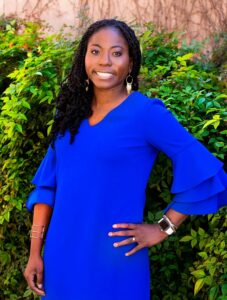
Written by special contributor Lance Fleming
It hasn’t taken long for Regi and Jasmine McCabe-Gossett to ingrain themselves into the community of Abilene. The two ACU graduates – Regi in 2009 and Jasmine in 2010 – have become a vital part of the fabric of the city, each serving on boards and committees to help direct the future of Abilene, and each helping charities, foundations, and businesses in the city raise money.
Yet despite having spent the last three-plus years as the Donor Services Director for the Community Foundation of Abilene, something was drawing Jasmine back “home” to ACU. And that draw is why she returned to campus this summer, leaving the Community Foundation to become the new Professional Development and Internship Director in the College of Business Administration.
“I’ve always had a connection to ACU; it’s where I earned my undergraduate degree, where I met the love of my life, and where I started my professional career,” she said. “Over the years, my involvement with COBA has continued to grow and evolve having served as a guest speaker, sat on the COBA Alumni Visiting Committee, and even teaching classes as an adjunct professor. Working with and teaching students has always been a sweet spot for me.”
But it wasn’t until she was in the process of interviewing for the new role that she truly understood that she was being called back to ACU.
“During the interview process, I unearthed Welcome Week pictures from my freshman year and felt a rush of emotions,” Jasmine said. “There were so many amazing experiences during my time at ACU that ultimately impacted the trajectory of my professional career.”
“I am forever grateful to those that invested their time in me sharing candid advice, empowering me to think outside of the box, and inspiring me to explore a career I never knew existed,” she said. “I am excited to serve and share key insights with COBA students as they prepare for this next season of their professional lives.”
And so, she finds herself back on campus, back in the building where she worked toward her Bachelor of Business Administration in Human Resources Management, and back where she launched a career that has seen her go from Workforce Solutions of West Central Texas to Hendrick Medical Center to Encompass Health Rehabilitation Hospital to the Community Foundation. Each of those stops – where she’s done everything from human resources to writing business service plans to the creation of leadership and development programs to helping raise millions of dollars – has helped shape who she is as she begins her work at ACU.
At ACU, she will be executing the professional development program, directing all aspects of the internship program, and will serve as a member of the Holistic Student Development Team. She’ll truly be helping shape the futures of students each year.
“This job is truly the convergence of all the things I am passionate about: building relationships, coaching, mentoring, and teaching,” Jasmine said. “I’m looking forward to helping center COBA as an epicenter for top new graduate talent. I am also looking forward to building a pipeline for COBA alumni to connect with and mentor undergraduate students.”
“I can certainly attribute much of my career success to those that came before me and made a concerted effort to pay it forward,” she said. “I’m looking forward to the ripple effect that will continue after students graduate from COBA.”
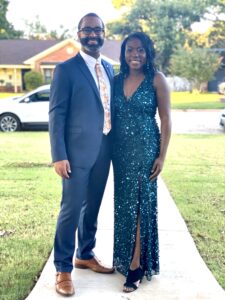 Neither she nor her husband, Regi, are from Abilene. However, they decided to stay in the city after graduating from ACU and have taken their love of the community and turned themselves into a powerful team. Jasmine currently serves on eight boards, while Regi has served on six boards and in 2020 was named one of Abilene’s Top 20 Under 40.
Neither she nor her husband, Regi, are from Abilene. However, they decided to stay in the city after graduating from ACU and have taken their love of the community and turned themselves into a powerful team. Jasmine currently serves on eight boards, while Regi has served on six boards and in 2020 was named one of Abilene’s Top 20 Under 40.
“The decision we made to put down roots here has been both motivating and rewarding,” Jasmine said. “Serving on nonprofit boards, in our church, etc., allows us to actively contribute to the exciting changes we want to see. We are honored to serve however we can.”
And it’s that heart for service and the love of building key connections that Jasmine hopes to pass on to the students she’ll be guiding at ACU.
“Much of my career has centered on building key connections both in the community and within organizations,” Jasmine said. “I’ve had the opportunity to both connect employee candidates to career opportunities they desire and philanthropists to community causes they are passionate about. Maintaining this theme of connection, the intersection of my experiences will allow me to connect students to career opportunities while also sharing key insights with students eager to learn how to authentically live out their faith in the workplace and beyond.”
Jasmine said. “I’ve had the opportunity to both connect employee candidates to career opportunities they desire and philanthropists to community causes they are passionate about. Maintaining this theme of connection, the intersection of my experiences will allow me to connect students to career opportunities while also sharing key insights with students eager to learn how to authentically live out their faith in the workplace and beyond.”
COBA is excited to have Jasmine at the professional development helm. To learn more about the College of Business Administration and professional development, click here.
 Central America Study Abroad trip with Dr. Mark and Dr. Laura Phillips in 2016. In 2018, they traveled to Turrialba, Costa Rica to visit CATIE, an agricultural university with a focus on economic development. In 2019, the first Social Enterprise Consulting class was offered and the partnership with CATIE began, focusing on economic development. But those students aren’t just in Costa Rica to observe. They are learning practical skills in research, marketing, and product creation from a class taught by Dr. Laura Phillips, Dr. Sarah Easter, Dr. Jennifer Golden, Dr. Mark Phillips, and Daniel Garcia. Currently, the class is working with local entrepreneurs to launch products made from materials donated by Southwest Airlines.
Central America Study Abroad trip with Dr. Mark and Dr. Laura Phillips in 2016. In 2018, they traveled to Turrialba, Costa Rica to visit CATIE, an agricultural university with a focus on economic development. In 2019, the first Social Enterprise Consulting class was offered and the partnership with CATIE began, focusing on economic development. But those students aren’t just in Costa Rica to observe. They are learning practical skills in research, marketing, and product creation from a class taught by Dr. Laura Phillips, Dr. Sarah Easter, Dr. Jennifer Golden, Dr. Mark Phillips, and Daniel Garcia. Currently, the class is working with local entrepreneurs to launch products made from materials donated by Southwest Airlines.  COBA was already seeking to make a broader societal impact through their programs. Now the Costa Rica activities are part of a broader COBA initiative. Dr. Laura Phillips said, “It’s exciting because AACSB is now asking us to do more of what we were already doing. The change isn’t to the consulting class. What’s different now is that we will have more activities (curricular, research, and engagement) focused on the same theme of Increasing Educational and Economic Opportunities for People in Marginalized Groups.”
COBA was already seeking to make a broader societal impact through their programs. Now the Costa Rica activities are part of a broader COBA initiative. Dr. Laura Phillips said, “It’s exciting because AACSB is now asking us to do more of what we were already doing. The change isn’t to the consulting class. What’s different now is that we will have more activities (curricular, research, and engagement) focused on the same theme of Increasing Educational and Economic Opportunities for People in Marginalized Groups.” towns near Turrialba. After their trip, Dr. Phillips and Dr. Easter approached Vargas to discuss the idea of starting a consulting class and having the group of female entrepreneurs as their first client. Vargas agreed, and Dr. Phillips and Dr. Easter took their first group of consulting students to Costa Rica in the spring of 2019.
towns near Turrialba. After their trip, Dr. Phillips and Dr. Easter approached Vargas to discuss the idea of starting a consulting class and having the group of female entrepreneurs as their first client. Vargas agreed, and Dr. Phillips and Dr. Easter took their first group of consulting students to Costa Rica in the spring of 2019.  As part of Southwest Airlines’ “Repurpose with Purpose” program, each of the company’s fleet of airplanes is overhauled every four years, and as a part of that process, the seat leather is replaced. The leather pulled out of the planes is donated to nonprofit organizations for upcycling projects.
As part of Southwest Airlines’ “Repurpose with Purpose” program, each of the company’s fleet of airplanes is overhauled every four years, and as a part of that process, the seat leather is replaced. The leather pulled out of the planes is donated to nonprofit organizations for upcycling projects.  The students’ client is called Wearsos – the first business to come out of the leather project – and it was started by the husband-and-wife duo of Lynne Corvaglia and Chris Riquelme. Aside from upcycled bags, the company also plans to make other products like passport holders, wallets, luggage tags, and shoes.
The students’ client is called Wearsos – the first business to come out of the leather project – and it was started by the husband-and-wife duo of Lynne Corvaglia and Chris Riquelme. Aside from upcycled bags, the company also plans to make other products like passport holders, wallets, luggage tags, and shoes.  “They learn that other cultures may have different objectives and priorities for their business than what they usually see in the U.S., and they learn that the American measures of success are not the only measures,” she said. “They also learn that to provide useful recommendations for the client, they have to truly understand the client’s objectives and tailor their business solutions to meet the needs and the desires of the clients.”
“They learn that other cultures may have different objectives and priorities for their business than what they usually see in the U.S., and they learn that the American measures of success are not the only measures,” she said. “They also learn that to provide useful recommendations for the client, they have to truly understand the client’s objectives and tailor their business solutions to meet the needs and the desires of the clients.”  etc.) to help a client roll out a Kickstarter campaign. Students listened to entrepreneurs talk about current and future product ideas as well as where and how they intend to sell and then provided a comprehensive list of questions to each entrepreneur to help them think through and further develop their business plans.
etc.) to help a client roll out a Kickstarter campaign. Students listened to entrepreneurs talk about current and future product ideas as well as where and how they intend to sell and then provided a comprehensive list of questions to each entrepreneur to help them think through and further develop their business plans.  Diego Lozano Welsh. A native of Coppell, Texas, Diego recently graduated with a 3.87 GPA as a business management major. In June, he will begin work as a Talent Acquisition Specialist for Sinacola, a construction company in Frisco, Texas.
Diego Lozano Welsh. A native of Coppell, Texas, Diego recently graduated with a 3.87 GPA as a business management major. In June, he will begin work as a Talent Acquisition Specialist for Sinacola, a construction company in Frisco, Texas. The headlines splashed across newspapers and websites around the country last December and into January certainly weren’t flattering for Southwest Airlines. The airline –annually among the leaders of all airlines in the United States in customer satisfaction – wasn’t making anyone happy with thousands of delayed or canceled flights that left travel-weary customers stranded in airports across the country as they scrambled to return home after the holidays.
The headlines splashed across newspapers and websites around the country last December and into January certainly weren’t flattering for Southwest Airlines. The airline –annually among the leaders of all airlines in the United States in customer satisfaction – wasn’t making anyone happy with thousands of delayed or canceled flights that left travel-weary customers stranded in airports across the country as they scrambled to return home after the holidays. Southwest Promise (the company’s COVID response for customers), spearheading the digital self-service and cabin modernization programs, and executing several other impactful
Southwest Promise (the company’s COVID response for customers), spearheading the digital self-service and cabin modernization programs, and executing several other impactful  Roach:
Roach:  the curriculum, and there are things you learn outside the curriculum. What ACU does is teach you that you can balance a lot of things at once. At ACU, you learn to balance your walk with Christ and academics. You’re blending two things. But I had three when you added athletics (Roach was on the ACU men’s basketball team). Understanding how to pursue and balance what is important to you at once is a skill that can continue to bless your life. I’ve also been lucky to have a father who has given me guidance along the way. He taught me that if you consult with God and walk with Him and abide with Him, He has your back, which keeps everything in perspective. He’s given me a great example; somebody to watch and do things with the right intent.
the curriculum, and there are things you learn outside the curriculum. What ACU does is teach you that you can balance a lot of things at once. At ACU, you learn to balance your walk with Christ and academics. You’re blending two things. But I had three when you added athletics (Roach was on the ACU men’s basketball team). Understanding how to pursue and balance what is important to you at once is a skill that can continue to bless your life. I’ve also been lucky to have a father who has given me guidance along the way. He taught me that if you consult with God and walk with Him and abide with Him, He has your back, which keeps everything in perspective. He’s given me a great example; somebody to watch and do things with the right intent.
 first year as the Professional Development and Internship Director for COBA. “Students have the distinct opportunity to apply what can feel like abstract theories and case studies to the real world. Internships are insulated and allow students to practice in an environment designed for them to ask questions and fail, whereas, post-graduate opportunities can be far less forgiving.”
first year as the Professional Development and Internship Director for COBA. “Students have the distinct opportunity to apply what can feel like abstract theories and case studies to the real world. Internships are insulated and allow students to practice in an environment designed for them to ask questions and fail, whereas, post-graduate opportunities can be far less forgiving.”
 said. “Doing so will allow them to fully immerse themselves so they can determine whether or not their dream industry aligns with their values, work style, etc.”
said. “Doing so will allow them to fully immerse themselves so they can determine whether or not their dream industry aligns with their values, work style, etc.” In more than 30 years as the minister at The Hills Church in North Richland Hills, Rick Atchley (’78) has delivered thousands of sermons to millions of people, drawing listeners from near and far to a relationship with Jesus Christ. In Atchley’s tenure with The Hills Church, it has grown to be among the largest Church of Christ congregations in the world, averaging over 5,000 in attendance each week across three campuses.
In more than 30 years as the minister at The Hills Church in North Richland Hills, Rick Atchley (’78) has delivered thousands of sermons to millions of people, drawing listeners from near and far to a relationship with Jesus Christ. In Atchley’s tenure with The Hills Church, it has grown to be among the largest Church of Christ congregations in the world, averaging over 5,000 in attendance each week across three campuses. students was a part of the Lytle Center’s Fall Speaker Series while his exhortation to faculty and staff was a part of the Lytle Center’s second annual Abiding in Christ dinner event. The Abiding in Christ dinner was established in 2021 with a vision of encouraging and challenging faculty and staff in the deepening of their relationships with Jesus in order to better influence and serve students. It should come as no surprise that Atchley had a challenge for each group. A mission to follow Christ no matter the setting or circumstances.
students was a part of the Lytle Center’s Fall Speaker Series while his exhortation to faculty and staff was a part of the Lytle Center’s second annual Abiding in Christ dinner event. The Abiding in Christ dinner was established in 2021 with a vision of encouraging and challenging faculty and staff in the deepening of their relationships with Jesus in order to better influence and serve students. It should come as no surprise that Atchley had a challenge for each group. A mission to follow Christ no matter the setting or circumstances. “They don’t have to come here to get knowledge; you’re good at that,” Atchley told the crowd. “You’re good at that. But when they leave with the knowledge you’ve given them, will they be wiser? Will they leave with a worldview that says ‘I’m going to look at life through the lens of the wisdom of Christ? He will be where I get my truth. He will be the framework from which I understand what is right and wrong.’ Will they leave with wisdom, not just knowledge?”
“They don’t have to come here to get knowledge; you’re good at that,” Atchley told the crowd. “You’re good at that. But when they leave with the knowledge you’ve given them, will they be wiser? Will they leave with a worldview that says ‘I’m going to look at life through the lens of the wisdom of Christ? He will be where I get my truth. He will be the framework from which I understand what is right and wrong.’ Will they leave with wisdom, not just knowledge?” As Atchley pointed out numerous times to the faculty and staff, the prevailing mission of ACU should be to not only equip students with knowledge and wisdom but also the desire to live out their faith in the world around them.
As Atchley pointed out numerous times to the faculty and staff, the prevailing mission of ACU should be to not only equip students with knowledge and wisdom but also the desire to live out their faith in the world around them. my faith,” she said. “However, I know this won’t necessarily be the case when I emerge into the workforce as a young professional. I value my faith deeply but have not been in many environments that challenge or counter my beliefs. I left the message feeling encouraged to stay true to my values regardless of circumstance and recognize how much of a difference it can truly make if I choose to let it.”
my faith,” she said. “However, I know this won’t necessarily be the case when I emerge into the workforce as a young professional. I value my faith deeply but have not been in many environments that challenge or counter my beliefs. I left the message feeling encouraged to stay true to my values regardless of circumstance and recognize how much of a difference it can truly make if I choose to let it.”
 Neither she nor her husband, Regi, are from Abilene. However, they decided to stay in the city after graduating from ACU and have taken their love of the community and turned themselves into a powerful team. Jasmine currently serves on eight boards, while Regi has served on six boards and in 2020 was named one of Abilene’s Top 20 Under 40.
Neither she nor her husband, Regi, are from Abilene. However, they decided to stay in the city after graduating from ACU and have taken their love of the community and turned themselves into a powerful team. Jasmine currently serves on eight boards, while Regi has served on six boards and in 2020 was named one of Abilene’s Top 20 Under 40. Jasmine said. “I’ve had the opportunity to both connect employee candidates to career opportunities they desire and philanthropists to community causes they are passionate about. Maintaining this theme of connection, the intersection of my experiences will allow me to connect students to career opportunities while also sharing key insights with students eager to learn how to authentically live out their faith in the workplace and beyond.”
Jasmine said. “I’ve had the opportunity to both connect employee candidates to career opportunities they desire and philanthropists to community causes they are passionate about. Maintaining this theme of connection, the intersection of my experiences will allow me to connect students to career opportunities while also sharing key insights with students eager to learn how to authentically live out their faith in the workplace and beyond.”